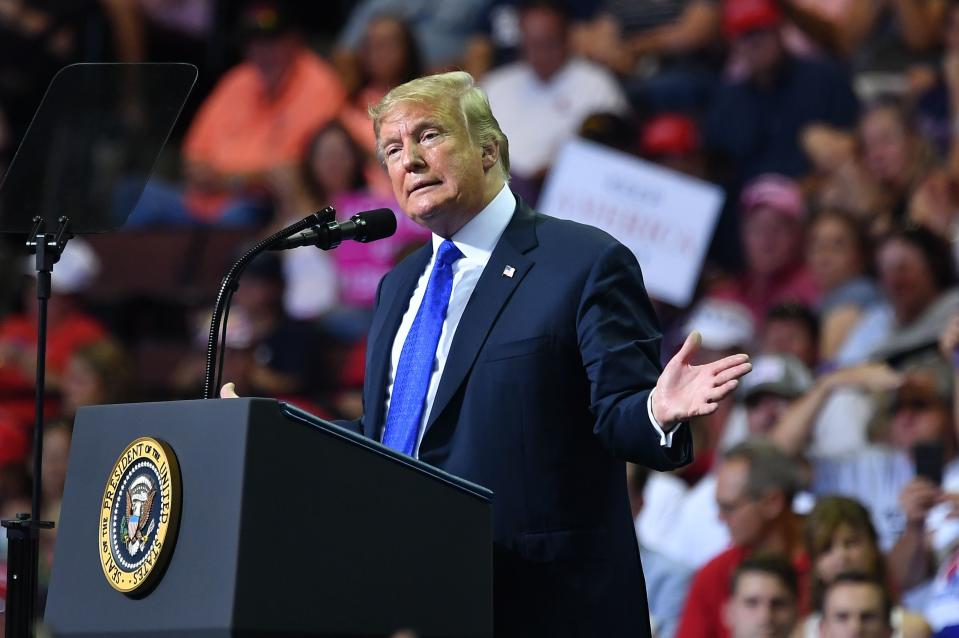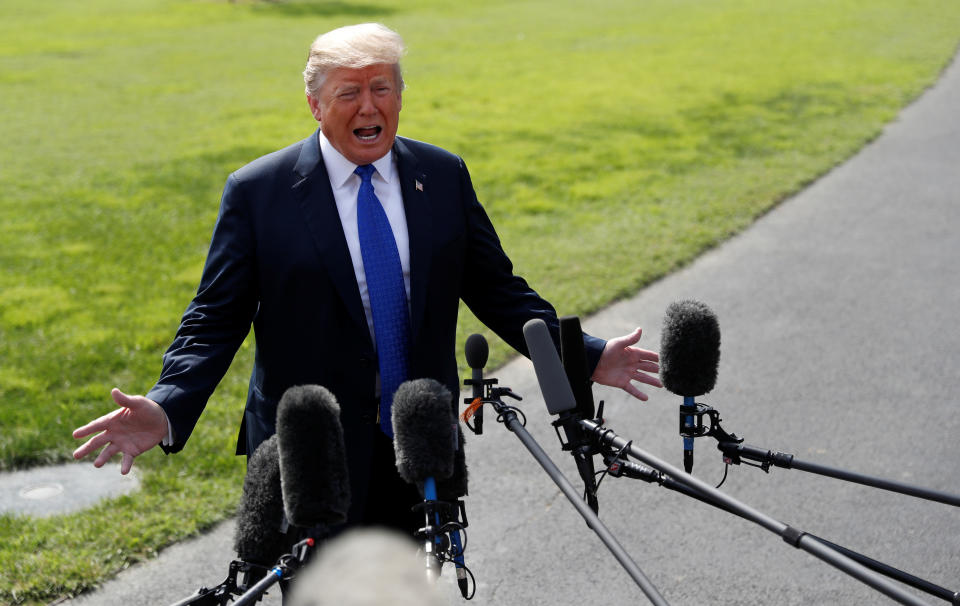Donald Trump plays 'Truth or Consequences'

“Truth or Consequences,” the first game show to become a hit on American television, began its weekly run on NBC in 1950. That year, Donald Trump turned 4, but by then he had already started receiving the equivalent of $200,000 in today’s dollars through a real estate scheme set up by his father to avoid paying taxes, according to a bombshell report published this week by the New York Times.
In a staple of the hit trivia show, host Ralph Edwards ambushed contestants by bringing out family members for surprise reunions. Unlike those heartwarming segments, however, the Times’s investigation cast a harsh light on Trump’s past, upending the myth the president has worked for decades to establish.
During countless interviews and on his own NBC show, “The Apprentice,” Trump portrayed himself as a self-made man who parlayed a paltry $1 million loan from his father into a fortune amounting to billions. In fact, Trump repeated the claim so much, he may even have convinced himself of its truth.
“My father gave me a very small loan in 1975, and I built it into a company that’s worth many, many billions of dollars,” Trump said during a presidential debate with Hillary Clinton in September 2016.
In fact, the Times reported, Trump received loans totaling $60.7 million, worth $140 million in 2018 dollars, and counter to Trump’s frequent assertions, much of it was never repaid, much less with interest.
While a lawyer for the president lashed out at the Times, describing its allegations of the Trump family’s “fraud and tax evasion” as “100 percent false, and highly defamatory,” Trump’s twitter response to the yearlong investigation was oddly muted.
“The Failing New York Times did something I have never seen done before,” Trump tweeted Wednesday. “They used the concept of ‘time value of money’ in doing a very old, boring and often told hit piece on me. Added up, this means that 97% of their stories on me are bad. Never recovered from bad election call!”

To the president’s supporters, it may seem a trivial exercise to parse exactly how much a father helped enrich his son, but the Times exposé certainly caught the attention of the people in charge of collecting taxes in the state where Fred Trump and his apprentice made their fortune.
“The [New York State] Tax Department is reviewing the allegations in the New York Times article and is vigorously pursuing all appropriate avenues of investigation,” James Gazzale, a spokesman for the department, told Bloomberg.
Equally worrisome for the president is the fact that should Democrats retake control of the House of Representatives, they will finally be able to procure what has eluded them for years: Trump’s tax returns.
While the intrigue over the president’s tax filings has been eclipsed by issues like Robert Mueller’s investigation into the Trump campaign’s possible collusion with the Russian government during the 2016 campaign, it’s worth recalling that Trump himself has regularly promised to disclose his returns.
“If I decide to run for office, I’ll produce my tax returns, absolutely,” he said back in 2014. “And I would love to do that.”
As the election neared, however, Trump’s enthusiasm waned, and an alibi surfaced.
Tax experts throughout the media agree that no sane person would give their tax returns during an audit. After the audit, no problem!
— Donald J. Trump (@realDonaldTrump) February 27, 2016
Contrary to the impression many voters might have received, there is no law preventing a taxpayer from releasing his returns to the public, whether or not that person is under audit. Trump has not produced a letter from the IRS confirming an audit, nor has he said which years are still under scrutiny.
While it has the potential to cause him legal and political trouble in the months to come, Trump’s tax truth was not the week’s most discussed story. That honor went to his Supreme Court nominee Brett Kavanaugh, a man whose views on whether a sitting president can be prosecuted for crimes could become crucial if Trump ever faces criminal charges.
The hiccup in what was supposed to be an easy confirmation for Kavanaugh came late in the process, when allegations of sexual assault surfaced, and before the Senate Judiciary Committee had advised or consented. For Trump, a man accused dozens of times over the years of sexual impropriety, days of playing nice with Kavanaugh accuser Christine Blasey Ford gave way to frustration at a Tuesday campaign rally in Mississippi.

“How did you get home? I don’t remember,” Trump said, mocking Ford’s incomplete memory of the alleged assault in the answers she gave before the Senate Judiciary Committee. “How did you get there? I don’t remember. Where is the place? I don’t remember. How many years ago was it? I don’t know. I don’t know. I don’t know. I don’t know. What neighborhood was it in? I don’t know. Where’s the house? I don’t know. Upstairs, downstairs, where was it? I don’t know. But I had one beer, that’s the only thing I remember.”
The irony of Trump seizing on holes in Ford’s memory was notable. The president, after all, has regularly boasted that he possesses “one of the great memories of all time,” except on the occasions when he finds himself in legal jeopardy.
In a deposition from a Trump University lawsuit, the transcript of which was released this week, Trump even struggled to remember saying he had the such an exemplary memory.
“Did I say I have a great memory or one of the best in the world?” Trump asked lawyers in a deposition after they questioned him about his memory claims, adding: “I don’t remember saying that. As good as my memory is, I don’t remember that, but I have a good memory.”
What many voters in America may well remember about this week is Trump’s embrace of men, like Kavanaugh and himself, who have been accused in the #MeToo era.
“It is a very scary time for young men in America when you could be guilty of something you may not be guilty of,” Trump told reporters Tuesday on the White House lawn before boarding Marine One. “This is a very, very — this is a very difficult time.”
While Trump stressed the bedrock constitutional principle of “innocent until proven guilty” in defense of Kavanaugh, he seemed to forget that he had, for decades, suggested the exact opposite when demanding the death penalty for the so-called Central Park Five.
When White House press secretary Sarah Sanders was asked on Wednesday by African-American reporters Ayesha Rascoe and April Ryan whether Trump still stood by his condemnation of the five boys falsely accused of brutally raping a woman in New York’s Central Park in 1989, she said she would “have to look back at the specific comments.”
One such comment Sanders has yet to review came in Trump’s explanation for taking out full-page ads in New York newspapers demanding the death penalty.
“The problem with our society is the victim has absolutely no rights and the criminal has unbelievable rights,” Trump told CNN’s Larry King at the time.

No, the case against Kavanaugh is not a criminal one. The Trump-authorized FBI investigation into claims about Kavanaugh’s behavior as a teenager will instead decide whether the judge receives a lifetime appointment to the Supreme Court. But to hear Trump recount the Senate Judiciary Committee drama, Kavanaugh took the role of the victim and Ford played, if not the criminal, then the useful pawn for those out to “destroy” his nominee, as he put it.
With partisan debate raging in Washington over whether the investigation’s scope was broad enough to determine what transpired between Kavanaugh and his accusers, Trump seemed upbeat by week’s end about the prospects for the judge who might clear him of future prosecution.
In a statement released Thursday, the White House said it “is fully confident the Senate will vote to confirm Judge Kavanaugh to the Supreme Court.”
Later that night the Washington Post posted an editorial advising the Senate to vote down the Kavanaugh nomination, and Kavanaugh wrote an op-ed in the Wall Street Journal explaining his angry rant against his political opponents at the Senate hearing last week. Did either message move the needle for any of the handful of undecided senators? Or were they ignored like so much toilet paper stuck to the bottom of President Trump’s shoe as he climbed the stairs to Air Force One following his Minnesota rally on Thursday. You be the judge.
This video of President Trump with toilet paper on his shoe is 100% real. He was boarding Air Force One in Minneapolis earlier today. pic.twitter.com/wr0ZnXknCx
— Beatrice-Elizabeth Peterson (@MissBeaE) October 5, 2018
The political calculus behind an up-or-down vote for Kavanaugh is complex. With one poll showing the confirmation fight has resulted in an uptick in voter enthusiasm among Republicans, Trump predicted in Minnesota that the Democrats’ “rage-filled resistance is starting to backfire.”
That may well be true. For now, however, it’s probably too early to assess which party will face the deeper consequences for the Supreme Court battle in the midterm elections. Maybe for that reason, Trump saw fit to test out what probably seemed like a much less complicated campaign message as a backup.
“The Democrats are truly the party of crime,” Trump told his cheering audiences, most of whom probably paid no attention to this week’s scoop on the president and his father in the New York Times.
_____
Read more from Yahoo News:



